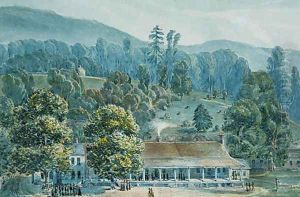John Hazelhurst Boneval Latrobe Paintings
John Hazelhurst Boneval Latrobe was an influential American figure whose contributions spanned across law, the arts, and civic development, marking him as a multifaceted personality of the 19th century. Born on May 4, 1803, in Philadelphia, Pennsylvania, he was the son of Benjamin Henry Latrobe, a prominent architect known for his work on the United States Capitol and Baltimore Basilica. This environment undoubtedly influenced Latrobe’s appreciation for the arts and architecture from a young age, setting the stage for his diverse interests and accomplishments throughout his life.
Latrobe pursued his education at Dickinson College, where he graduated in 1821 before embarking on a career in law. He quickly established himself as a reputable lawyer in Baltimore, Maryland, where he would spend the majority of his professional life. Beyond his legal career, Latrobe was deeply involved in the cultural and societal development of Baltimore and the broader American landscape.
In the realm of the arts, Latrobe was a passionate advocate and practitioner. He was significantly involved with the Maryland Historical Society, contributing to the preservation of Maryland's history and art. His efforts in the arts were not limited to curation and preservation; he was also known for his skill in drawing and painting, particularly landscapes, which were well regarded by his contemporaries.
Latrobe's influence extended into civic contributions as well. He played a crucial role in the development of the Baltimore and Ohio Railroad, serving as its legal counsel. This position not only highlighted his legal acumen but also his vision for infrastructure and development in the United States. Furthermore, Latrobe was instrumental in founding the Maryland Institute for the Promotion of the Mechanic Arts, underscoring his commitment to education and the advancement of arts and sciences.
John H.B. Latrobe's legacy is also marked by his philanthropic efforts, notably his involvement in the colonization movement through the American Colonization Society, where he served as president. This organization, which aimed to resettle free African Americans in Liberia, reflects the complex and sometimes controversial aspects of Latrobe's career, mirroring the broader societal tensions of his time.
Latrobe's impact was recognized through numerous awards and honors during his lifetime, reflecting his contributions to law, the arts, and society. His death on September 11, 1891, marked the end of a remarkable life that had significantly shaped the cultural and civic landscape of 19th-century America. Today, John Hazelhurst Boneval Latrobe is remembered not only for his legal and civic contributions but also as a figure who passionately advocated for the arts and education, leaving a lasting legacy on the American cultural and societal fabric.
